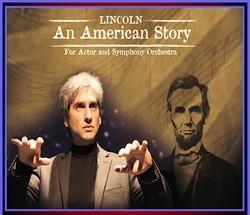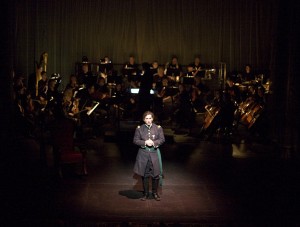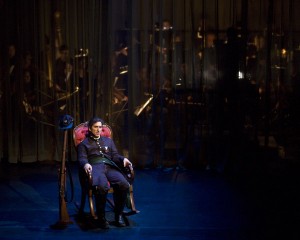THE DISNEYFICATION OF LINCOLN’S DEATH
In many ways, Hershey Felder is a theater machine. In his four previous self-crafted one-man shows, the earnest and multi-talented actor/pianist/composer brought to life Gershwin, Bernstein, Chopin, and Beethoven. The man has created a fervent and dedicated fan base around the world, engaging audiences with his intensely dazzling musical interpretations: effusive adjectives such as brilliant and inimitable understate his impressive piano skills. His single-set shows, all directed by Joel Zwick, are also fairly inexpensive to produce and have massive appeal to an older audience: he addresses spectators directly and, in some cases, has a question-and-answer period after the written portion of the play, revealing remarkable erudition. This means that only Felder can do a Felder show, which in some ways is a shame: he is no doubt a competent actor, but his style is somewhat mannered and often languid. Detractors can say he is more of an entertainer than an actor and that his plays could be better-shaped (the structure in some shows makes it unclear whether his subject is alive in the 21st century or speaking to us from the dead), but he has a keen aptitude for storytelling and is genuinely interested in pleasing his viewers.
Now Felder brings us his most ambitious work to date: Lincoln – An American Story, and it is surely one of the most fascinatingly misguided attempts I have seen in years. This time, he eschews his virtuosic pianism, instead composing and arranging the score which accompanies his Civil War tale. Backed by a live, impeccable 45-piece symphony orchestra, immaculately conducted by Alan Heatherington, Felder portrays Dr. Charles Leale, the 23-year-old medical army surgeon who attended to the dying Abraham Lincoln both at Ford’s Theatre and at the tiny Petersen House across the street where the beloved President died.
The story is riveting as Leale describes his witnessing of a sobbing Walt Whitman in an army hospital, the actress Laura Keene cradling the bleeding President’s head in her lap, and his profound discomfiture as the First Lady and others looked to Leale as the only hope of saving the mortally wounded Lincoln. Even in its mawkish proceedings, An American Tale had the audience at the Pasadena Playhouse spellbound. Not in recent memory have I experienced a full house so rapt, respectful, and reverent; for ninety minutes, there was not one cough or shuffle, as if one single soul existed for a magic moment in the theater.
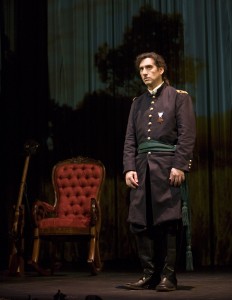 But I am convinced that the viewer’s veneration was not for Felder’s performance, which, while never short in sincerity, lacked depth and focus (the presence of director Joel Zwick is virtually unseen in Felder’s unmotivated movements and various other inadequate portrayals). No, the honorable respect was both for the astounding story of a pivotal moment in world history and for Lincoln himself, that rarity in antiquity: an incomparable leader who could eloquently articulate a nation’s troubled soul.
But I am convinced that the viewer’s veneration was not for Felder’s performance, which, while never short in sincerity, lacked depth and focus (the presence of director Joel Zwick is virtually unseen in Felder’s unmotivated movements and various other inadequate portrayals). No, the honorable respect was both for the astounding story of a pivotal moment in world history and for Lincoln himself, that rarity in antiquity: an incomparable leader who could eloquently articulate a nation’s troubled soul.
While the venerable showman is to be commended for showcasing how powerful great storytelling can be, there was not even an attempt to make Felder appear as the bewhiskered Leale – this was a night more about Felder as Leale than a show about Leale himself. And the inappropriate, melodramatic, studio-sounding score, although impeccably arranged, smacked of the lush strains which accompany the audio-animatronic Rail Splitter in Great Moments with Mr. Lincoln at Disneyland.
Felder cleverly incorporates themes of Stephen Foster (“My Old Kentucky Home”) and John Howard Payne and Henry Bishop (“Be It Ever So Humble, There’s No Place Like Home”), but the use of minor keys made the maudlin music occasionally sound Yiddish in nature.
I believe that Felder authentically wishes to imbue us with the spirit of the drum and the fife, and he has put an astonishing amount of work into this project, the most successful aspect of which is much of the script, aided no doubt by dramaturges Cynthia Caywood and David Hay. Perhaps I am a sucker for American history, but the premise is truly inspired: use one man’s true story, barely a historical footnote, to conjure up in vivid detail an event of unspeakable grief.
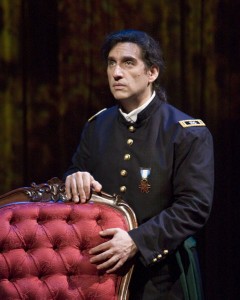 There are parts that can be fixed: Lincoln’s foreboding about his own death led to his creation of a haunting poem which begs to be spoken, but Felder actually sang the verse in a competent but quavering vibrato, no doubt showcasing that he can sing as well (although, truthfully, Felder’s voice is better-suited for a temple than a stage). Why not save the singing only for that poignant moment when Keene, who was performing in Our American Cousin on that fateful night, sang “Beautiful Dreamer” to her cherished President while stroking his blood-matted hair?
There are parts that can be fixed: Lincoln’s foreboding about his own death led to his creation of a haunting poem which begs to be spoken, but Felder actually sang the verse in a competent but quavering vibrato, no doubt showcasing that he can sing as well (although, truthfully, Felder’s voice is better-suited for a temple than a stage). Why not save the singing only for that poignant moment when Keene, who was performing in Our American Cousin on that fateful night, sang “Beautiful Dreamer” to her cherished President while stroking his blood-matted hair?
Due to many incongruous moments such as this, the occasionally well-written show felt more like a machine than a resonant theatrical experience. Thus, when the Gettysburg Address was finally spoken, the proceedings and the score (reeking of a Hallmark special on TV) made me emotionally constipated. That was what made this event so fascinating. How can a moment be so powerful and poignant, yet so soppily filled with the treacle of purpose-pounding patriotism at the same time? While waiting in anticipation to see if I was going to cry or throw up, it would not have been surprising had The Young Americans come bounding onto the stage in red, white and blue antebellum costumes.
The multi-media was astoundingly beautiful, such as starry skies and burning buildings (projections by Greg Sowizdrzal and Andrew Wilder, special effects by Pat Cain), and Erik Carstensen’s stereophonic sound was the best ever heard at the Playhouse. The giant swagging curtains (scenic design by David Buess and Trevor Hay) and subdued lighting (Chris Rynne) were lovely to look at, but the visuals were yet another reason that the evening unfolds like a Disneyfication of history.
Like our distressed homeland, this event is filled with promise, but it is hoped that Felder and Zwick do some serious retooling before Lincoln – An American Story plays in repertory with the other Felder creations. Until then, this is theater of the Felder, by the Felder, and for the Felder.
photos by Craig Schwartz
Lincoln – An American Story
Pasadena Playhouse
39 S. El Molino Avenue in Pasadena
ends on April 7, 2012
for tickets, call 626-356-7529 or visit Pasadena Playhouse
